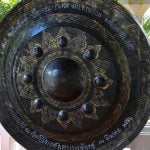One of the questions that I often get in teaching cartomancy pertains to how we distinguish between the court cards. Who is who on the table, when the court cards show up?
I read the cards according to the function that I see each card embodies, whether I look at trumps, pip cards, or the court cards.
The suits are stylized ideas of our natural laws, as these interact with our way of coping with them.
— The wind is too strong? Well, build a house.
— With what?
— How about some trees?
Batons
Can we think of trees, in their stylized form as batons on the cards, as having an association to the idea of building, chopping wood and all that Zen-like attitude towards routine work that would be a good idea for us all to have, lest we should succumb to too much pressure? Indeed, we can think of the primary meaning of batons as ‘work’.
What else do we know of trees?
They tend to grow tall in the air. The wind has a funny sound through the trees and their crowns.
— Would it make sense to associate the trees with air, then?
— I should think so.
What else? Trees have an interesting structure in their bark. Sometimes we can think of it as heavy skin. Rough. Unpolished.
The bark smells. It smells of the woods and the natural world. Sometimes animals take a piss on the trees, and then some funny looking weeds, both poisonous and not, grow by the roots. Hmm, I wonder what it all means. Very Saturnian.
If we gather the dead branches out in the woods, we can make a mighty fire with them. That is, after we build that luxury log house we dream about, the one that protects us from the strong western winds, or from the hustle and bustle of the city, its merchants and their transactions enabled by weirdly looking processed golden coins that tend to have the face of some schumck leader or other imprinted on them.
Well, not real gold nowadays, as folks down history have long since given up on the necessity to have real gold passing through their hands whenever they need to trade shit for shine.
This wise decision was, of course, mediated by the merchants of the world, the sanguine folks, very good at rhetoric, and very good at convincing the wood people of the benefits of working for the government.
After all, when you’re done with your own log house, maybe you can build ten or a hundred more just like the it.
All it requires is hard work. But you won’t mind it, really, as what you’re good at is in fact exactly that, chopping wood — whether for your own private use or for the public condo.
Who cares? You get paid, and work exhilarates you.
— Is the King of Batons a King of work, then?
— Why, yes he is.
What else can we know of the King of Batons, other than the fact that he smells, he works like a maniac and demands the same?
He plans a lot — all that wood needs counting — he builds connections, and he’s good at figuring out which stick fits what hole. That’s quite enough already.
Essentially, however, all we need to do is think this: The suit of Batons equals a whole lot of wood.
Coins
Whoever is in charge of the coins, and now virtual banking transactions, belongs to the group of very smart folks. Their brains are irrigated by blood in an almost mystical way.
Well, so it goes with all the trickster gods. If they’re good at anything, that’d be commerce and how to make others work for them. Yep. You gotta have a lot of brain power to convince the wood folks to work for you. And then for what exactly?
For losing the very thing that feeds their need for work. How many more forests must go down? Too many.
The result? A cold and dry temperament.
The wood folks will get depressed — ‘melancholic’ they used to call it — and will soon be in need of making a new transaction: More work in exchange for a soul.
If the coin, Mercurial type of folks will not be able to provide the service, they will be sure to direct the wood folks to a professional.
They are after all masters of fixing ambivalence. They know everything about crossroads, whether asphalt or clay.
The coin folks are wired.
Cups
The water people are the phlegmatics of the world.
— What’s that?
— Well, that is desire with a capital D.
Here comes Venus, the Goddess of Love and Money. We all want that, but some want that really badly. They will pray to the moon and back for it.
Just think of what we do with water in its stylized form as we find it on the cards in the form of cups filled with liquid, or as hearts.
With cups we make a toast, invite friends for a nice ritual of libation, and then watch how everybody will get their tongues untied, giving way to a whole lot of repressed emotions and desires, disclosing also just what a mighty power the power of insatiable desire is.
If the wood folks come to the water folks, the water folks will know how to show sympathy. On rare occasions they will show compassion, Jupiter style, but sympathy is more frequent.
After all, since the water folks crave stuff all the time, they are the masters at craving, there’s only so much empathy they can display.
But they will be able to hear the pulse in your veins, pumping through your heart.
This pulse is close to what the water folks are good at identifying: Circulation. Any flow of blood is their specialty.
Swords
Spilling blood. That’s the domain of the choleric folks, the Mars folks, the warriors, the ones who are good with a sword in their hands.
They have one mantra only, which they repeat incessantly: ‘Off with their heads.’
When they’re done with all that chopping of heads, guess what, some digging is necessary.
Where do you suppose that all those spades represented on playing cards come from? The digging of the earth.
Swords and earth. Do you see the connection? The two malefics, Mars and Saturn. You don’t want to go against them. Their presence in any layout spells out trouble.
Imagine to live in this paradox:
In order to know the coldness of the earth, you need to have a very hot head, blinding your actions. ‘En garde!,’ the Solar fixated French cloak and dagger folks used to shout all the time in those noble days of chivalric retribution, using the hottest passion and the coldest head, thus inverting the order of things: Hot head and cold passion.
But who cares, as long as somebody dies. Exhilarating.
If the choleric swordsmen play their cards right, they might even get either the wood folks to dig the graves for the dead, or the water folks to officiate the burial, or more likely to shed some tears on behalf of the community.
Where do you think that all those traditions of lamentation come from? Keening, anyone? The Irish are very good at it. Not to mention the Romanians.
Who Died?
I don’t know about you, but I have participated in many funerals, including those of my parents when I have witnessed the following:
The wood folks provided the coffins and the external planning of what to do with the dead corpse, how to dress it and all that. Work.
The water folks provided the libation and the tears. Family comforting.
The coin folks took our money and promised to facilitate help in case of a nervous breakdown. Fast messengers.
The earth folks dug the graves with their spades, and nailed the coffins.
Friend or Foe?
We all sit at the table together, eating or stabbing each other if the drinks go to our heads.
We sit together in church, or by somebody’s grave. We comfort each other, or slander each other. We love each other, or kill each other.
The suits represent the four universal types we all recognize from our walks of life. Some are lumpers, some are splitters.
The court cards leading the numbers are all faithful representatives of their kingdoms.
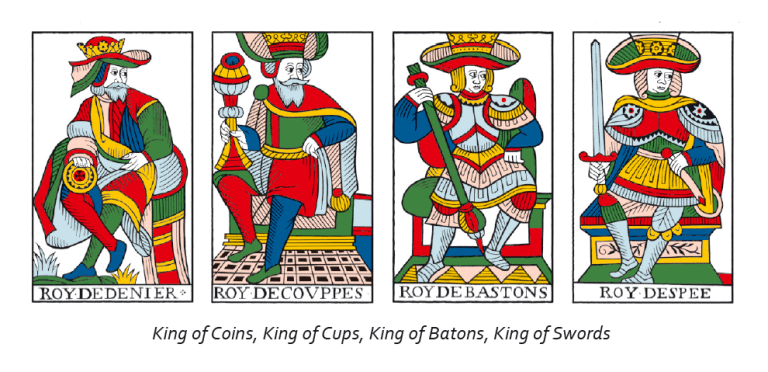
What does a King do? Sit on it, sit on his achievements.
A King is above having to prove himself, to consolidate stuff, to make transactions. He delegates. He has others do these things for him.
Therefore he embodies a symbol of power in its static manifestation. If Cups, man of love; if Batons, man of work; if Coins, man of money; if Swords, man of war.
The Knight is an emblem of consolidating the King’s business in an active way. He’s into developing.
The difference between a symbol of power and an emblem of development is one of rank. The Knight acts on behalf of, whereas the King is at the top, commanding and controlling power.
The Queens, as the creators of the world, fulfill their function of being guardians of sacred knowledge, and hence of truth.
They embody a different kind of power that’s aligned with how we see with the logical eyes and how we see with the so-called illogical eyes — this latter idea, especially as seen from the perspective of culture.
Pages are agents at the mercy of others. They are sons and daughters, messengers, or apprentices.
Their presence in a string of cards, especially if the string consists of the highest rank court cards, can indicate the thoughts or emotions of these higher powers.
The Page of Cups can be an emotional extension of what the Queen of Cups is thinking about, or what she intends to act towards.
They can also be seen as stages towards the manifestation of the mighty power that a King possesses.
If the King of Swords doubts as to whether he must engage and go to war or not, the presence of the Page of Swords in the sequence of cards will most likely confirm this ambivalence, the Page of Swords being a nasty little thing, always intent on splitting relations, rather than finishing them off the honorable way, in a duel, or in actually going to war.
The Page of Coins aspires to make money, but he lacks the cunningness of the King of Coins.
At the other pole, the Page of Cups is always sweet and floundering, encouraging his single mother to find a husband for herself.
Oh, the sympathy that can turn nasty, if the Queen is too impressionable herself, and unable to discern what the truth is.
Truth or Dare?
I see the idea that the Queen equals truth as related to the way we make a distinction between the public and the private spheres.
At least that’s my conclusion after reflecting on the cunning folk cartomancy, often referenced by others in various books and online resources, but without full explanations as to why we equate a court card with a certain idea (see, for instance, a favorite of mine, Dawn Jackson’s Hedgewytch method, which, although logically wonderful and sound, often falls short of examining the root of the logical thread behind why we say what we say).
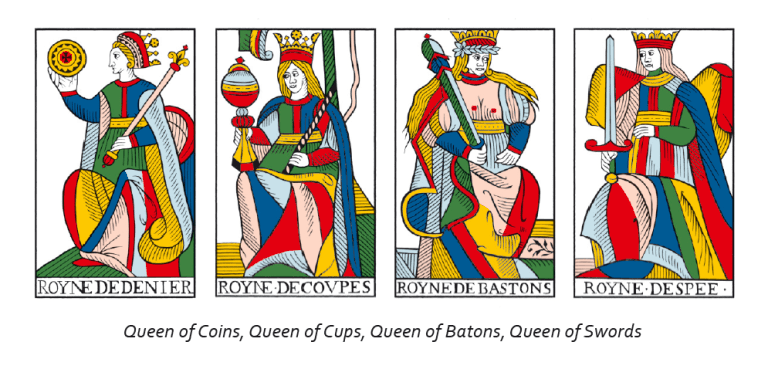
This is fair enough, as the best way to go about it is to think for yourself. Let us assume, then, that since a queen is not considered ‘a man of action’ she may sit on the domain of thought, thus approving of our attitude of thinking for yourself.
Consequently, after I was done with my own share of thinking about it, here is what I have arrived at:
Traditionally men have occupied the public sphere — well, they still do — and women the private sphere.
Where is it more likely to find the truth? Obviously not in the public sphere where politicians set the agenda. The truth is the closest to us, our private place, our soul. Who has access to this? Women. That’s my reasoning.
I haven’t seen others talk about it in this specific way, though it is likely that you can stumble over similar, albeit much more abstract notions.
In books about esoteric tarot people refer to the court cards as having to do with an expression of the within and without dichotomy, or indeed as following the hermetic axiom: ‘As above, so below’ (see Marcus Katz’s work).
In other tarot books that have a psychological bent, you’ll come across the court cards as described in terms of their helping or non-supportive attitude (from counselors to abusers, critics, victims, champions, and so on; see Kate Warwick Smith’s work).
Functions
As far as I’m concerned, the court cards qualify to perform a function all according to the suit they embody and the context of the question.
Whether the King of Swords is a bad magician today and a good magistrate tomorrow will be something we can determine according to how we see the essential qualities of the suit of swords in alignment with the context of the question.
Furthermore, the distance between action and truth, the public sphere and the private sphere, and men and women is also determined by the surrounding cards.
If your question is about your need to know some truth, or it has an investigative character, then the presence of the Queen will tell you what you need to focus on.
If the Swords, the truth is distorted; if the Cups the truth flows. The other suits give you a ‘maybe’.
It’s the question and the context that give you the answer to when the Queen acts as an emblem of truth or not.
What is the question, exactly?
If the question is one about how to handle the truth, then the presence of the Queen of Swords alongside the King of Cups suggests difficulty in admitting to suffering from blind spots.
The Page of Swords alongside the Queen of Swords suggests intentional lying, where the Page modifies the Queen’s thoughts or intent for the worse.
The Knight of Batons can be a real estate agent when in the presence of the King of Coins, and so on.
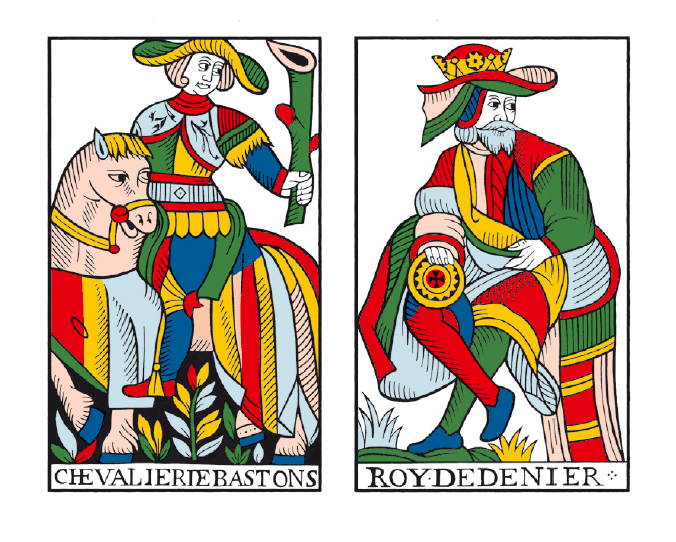
Beyond cultural pre-conditioning, when we have to determine who all these court people are, populating our spreads, we can remind ourselves that we can also see with something other and more than our cognitive capacity to decode, interpret, and make aesthetic evaluations, or judgments.
We can see how, following the suits, we are more prone to becoming obsessed with money than with work, and committing a crime of passion than passionately going to war.
The reason for this is related to the closeness of the four stylized ideas in the cards of love, money, work, and war to our own concerns.
Coins make us sweaty and hot. The heart can beat fast and rush us into action. Work schemes won’t excite us nearly as much as money schemes, and war hardly ever wins in the affairs of the heart — though heads may fall.
Swords and batons are long, and we hold them at arm’s length. We hold coins in our palms, and the blood in our veins keeps us alive.
What is our most immediate need? Shelter and love. Money buys us the house and the bedroom. We only need to go to war, or compete, if the neighbor has her eyes on our property.
The Self and the Other
Court cards always represent other people. They hardly ever represent ‘aspects’ of ourselves, not even when we try to stretch our esoteric politeness.
Court cards as aspects of us are pretty useless, and in mundane questions they never work. Telling someone who gets the Queen of Cups and the Queen of Coins side by side that this indicates how she can sometimes be full of love and other times full of brains will hit a nerve, for sure.
But how specific is that? Aren’t we all like that? Aren’t we sometimes loving and sometimes innovative?
Generalities never move anyone.
Think in specific terms beyond the cliché.
Pick a significator
The best is to go old school, and always pick a significator before laying out any larger spread of cards.
The significator must be aligned first with the profession of the person asking the question, and then, following tradition, with the physical traits.
Traditionally, a blondish, a red head, or a woman with white hair, is represented by the Queen of Coins. If she’s a professor, or manages the bank, you’re set. I start with this latter attribution.
The Queen of Cups is a mother, or a woman working in healthcare. She also tends to be blond — go figure…
The Queen of Batons knows her business, and handles practical matters with mastery. She is an enterprising brunette.
The Queen of Spades is the darkest in complexion, and works as a judge or a bad witch — the question decides whichever.
The King of Batons is a manager or boss , of dark complexion, and the King of Cups a father, a counsellor, or a priest, a blond man.
The King of Swords is a magistrate, a policeman, George Clooney in Ocean’s Eleven, or a mentalist. Usually he is the darkest in complexion.
The King of Coins is a financial tycoon, freckled or reddish blond towards olive complexion.
The Knight follows suit regarding profession and physical traits, and acts as a delegate.
If the King is a general, the Knight is his soldier (Swords).
If the King is a bank director, the Knight speculates on Wall Street (Coins).
If the King is a cardiologist, the Knight is a seducer (Cups).
If the King is a developer, the Knight is a forest ranger (Batons).
Pages study or deliver messages (Coins), meddle in others’ affairs without concern (Swords), work for a herbalist (Batons), or daydream (Cups).
There’s hardly any ambiguity as to who does what and for what purpose.
Because of this purpose, the court cards give us a sense of direction. In their presence we’re not in any situation that makes us doubt: ‘Maybe this is also an aspect of you immolating yourself.’
The court cards in readings
Let’s look briefly at a couple of examples:
The first is the classical square of 9 cards.
This example comes from a reading for a woman writer whose field is Western esotericism and occultism. I picked the Queen of Diamonds as her significator. I did not put her aside, but left her in the pack.
Generally, if the significator shows up in the spread, it will indicate that the querent will take an active part in the dynamics of what is being asked about.
If not, then we can see it as a sign that the querent will be impacted on by factors that are more external to her concern.
Here is the woman’s question:
What exactly characterizes the people I write for, and how can I best serve them?
How do I develop a stronger sense of belonging?
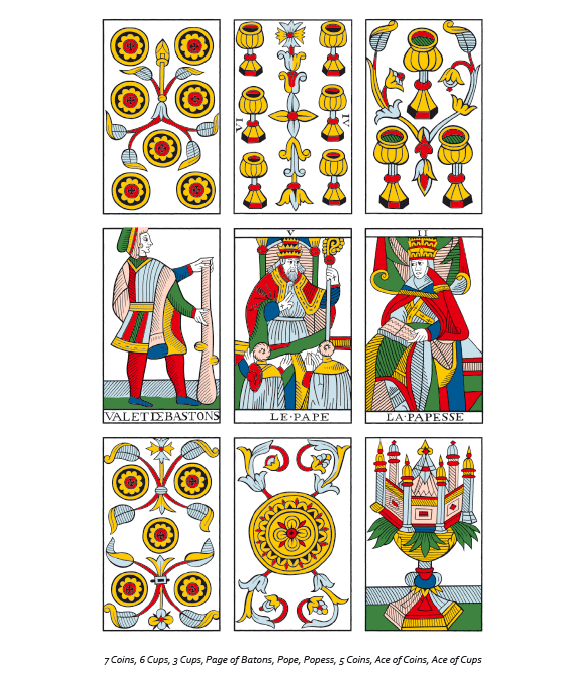
In this 9-card tableau we got only one court card.
This is not so surprising, given the nature of the question to identify the traits of the folks the querent wishes to belong to and serve. The court cards tend to pop more frequently in questions about family or relationships at work.
I picked this example, however, even though it only features one court card here, the Page of Batons, simply because I found that it participated in giving a very literal answer.
As the significator, the Queen of Coins, didn’t show up in the spread, we can infer that this is due to her having some doubts, indeed, as to where her writing belongs. But it’s clear that her skills belong with the spiritual folks.
The center card is the Pope, flanked to the left by the Page of Batons, handling a rough staff, and the Popess, or the High Priestess, handling a book.
The Page here is simply the altar boy, who is also out in the yard fixing things. The cards in the middle spell it out quite clearly that the querent’s folk is church folk, or ritualists.
What we can note here is that we have quite a preponderance of coins and cups over batons and swords. Swords are not even represented at all.
We’re thus with the suits close to us, giving us access to what we hold in our hands in a more intimate way, cups and coins, rather than the distant swords and batons.
If we were to describe the people our querent is interested in writing for, we’d say the following:
They have money problems, but know the way of the heart and how to have a good time (7 Coins, 6 Cups, 3 Cups).
As we’re with the coins here, representing mental power within the context of the church and ritual, we can impose a spiritual reading on the card of the 7 Coins as it relates to divination and fortunetelling, clairvoyance and mystical vision.
Basically, if you’re mental in the church that means that you’re a mystic of sorts.
In a magical setting, the number 7 cards are the only cards that can change status, from indicating trouble, in a mundane situation, to suggesting shapeshifting; vision if coins, practical and talismanic magic if batons, mysticism and gnosis if cups, and ‘black’ magic if swords.
At the core of this tribe is a spiritual leader, attended by his apprentice and a wise woman (Page of Batons, Pope, Popess).
The community may struggle with money, but when the folks here get their hands on it, they spend it all on themselves, and then take a ride on the flying carpet towards the One love (5 Coins, Ace of Coins, Ace of Cups).
These folks are good at casting circles, creating some good sigils, and making lavish offerings in the form of libations, judging by the looks at the Ace of Coins and the Ace of Cups.
If ever a spiritual community is led by the motto: ‘Love is all you need’, we get a confirmation of it here.
The Page’s work consists of swinging his bat between visions and relics. With lots of vigor.
Money goes into setting up altars that look good and smell good, or other type of ritual jewelry that spiritual folks like to adorn themselves with (7 Coins, Page of Batons, 5 Coins).
The Pope leads the way and delivers messages of roundness: ‘God bless everyone, and don’t fall off the magic carpet. Have another ritual drink’ (6 Cups, Pope, Ace of Coins; 6s are for travel).
Everyone enjoys the party under the watchful eye of the High Priestess, who makes sure that the Holy Grail is filled to the brim with the good stuff (3 Cups, Popess, Ace of Cups).
This tribe is into love and visions, money magic, and wisdom.
Who wouldn’t want to belong here? A good message for our Queen of Diamonds, the querent, who is already on this path, having written some short stories that had magic as a topic.
But she wanted to know how she could make herself more visible to this tribe — upon observing that her presence was missing from this party.
Basically she was concerned that she wrote for people who didn’t really see her, while nonetheless consuming her offerings.
I turned up the bottom card from the cut deck. It disclosed the 7 Cups.
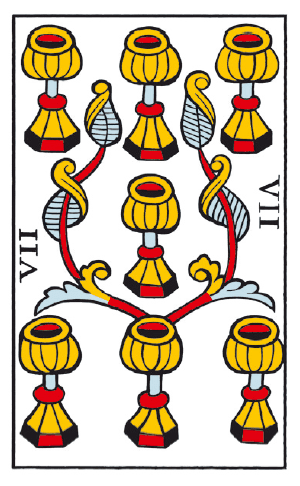
‘More love,’ I said. Make an offering, and stand out. You belong already. The 7 Cups is a card of spirituality, so start contributing to filling that big chalice in the middle with your own libations. It will be appreciated.’
But then I added the note that, traditionally, whenever the Popess shows up in the layout, she has a relation to the querent, if not representing the querent directly, then in an implicit way.
Here the link between the Popess and her book and the Queen of Coins and her book was more direct, given the writing profession.
Quite literally, as the Popess is dealing with books, she mirrors what the Queen of Coins does: Reads and writes books, and thinks a lot.
As you can see, then, although we didn’t have any reason to wonder about agency here, and fret about the question of who is who, we could read the one court card here precisely according to the function that it performs:
A young man participating in making the spiritual community magical, and also giving a direct message to the querent about the more nuanced aspects of the community of people she is serving, ritual being one of their primary concerns.
My advice was to write more intricately about all aspects of ‘church’ life, and suggest what talismanic value love has for organized spirituality.
My Family
The second example features a line of 5 cards, for which I picked no significator in advance.
A man wanted to know:
What is our common goal in our family?
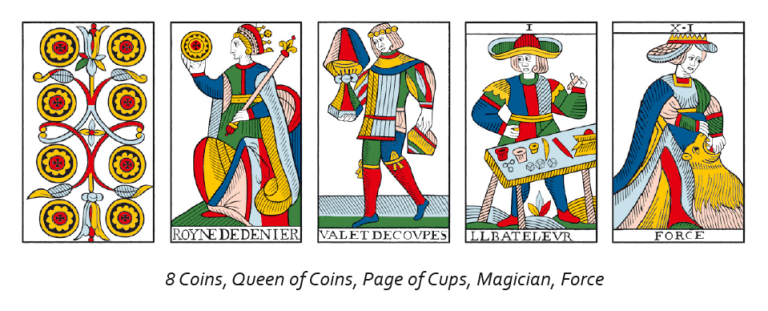
Following the direction of the gazes in this spread we notice the following: The goal is money.
It starts with a financial-like meeting presided over by the woman of money, the Queen of Coins, who brings her own contribution to it.
A loving young man, the Page of Cups, follows this woman (not his blood mother, as the querent also validates), and brings his emotions to the table.
The Magician watches the parade, and follows the Page of Cups. He is probably also thinking: Can I make more money?
The Queen is closer to the money than the Magician, so money is more important to her than it is to him. He is gazing towards money from some distance, but it looks like he enjoys more the idea that he can just make money happen out of the blue. That’s what a Magician does, after all.
The last card in this line indicates a tension. Although the common goal seems to be chasing after money, the Magician is not on the same page as the Queen and the Page. He even seems to be wondering: What’s this fascination with money that the Queen mirrors, and the Page desires?
The card of Force shows a female trying to tame an animal. A force seems to pull the Magician away from the monetary goal, enticing him to recalibrate his focus on something wilder and more essential than the culture of money.
As he is not aware of this force — he’s not looking towards what else is there — it is no wonder that he ends up seeking the service of a fortuneteller, who can help him sort out the family circus.
A good thing we’re here to serve.
A Community of Agents
To sum up, the court cards are agents helping us or blocking us from achieving what we want. They can counsel us, sell us down the river, talk about us behind our backs, or stab us. They are mortals who act in their own right, just like we do.
A good reading of the court cards will take into consideration the dynamics of the interrelation between ourselves and others, our contexts and platform for action and those of the others.
Sometimes we mirror ourselves in what the court cards do, but these other agents are never us.
We come into the world, we live, and we die. While quite alone on our life path, we encounter others who tell us their stories.
This is the function of the court cards: To tell us a story that teaches us something about ourselves, how to live and die better, how to better breathe the air we share, and how to think of our own role and place on this planet.
If we’re still confused, we can call in the trumps, or let the numbers speak what there is to speak, in that beautiful and abstract manner that only numbers are capable of.
Check out the forthcoming book, The Power of the Pips, where we look at the ways in which numbers can be brought closer to our mundane experiences, while retaining their infinite, mathematical potential.
§
For more on the question of agency, court cards, pip cards, and trumps, you’re welcome to also consult my book, Marseille Tarot: Towards the Art of Reading.
NEWSLETTER
Stay in the loop. Join The Art of Reading. Get a gift: Read Like the Devil: A Crash Course.

Patheos Pagan on Facebook.

the Agora on Facebook
The Cartomancer is published bi-monthly on the second and fourth Wednesday here on the Agora. Subscribe via RSS or e-mail!
Please use the links to the right to keep on top of activities here on the Agora as well as across the entire Patheos Pagan channel.


